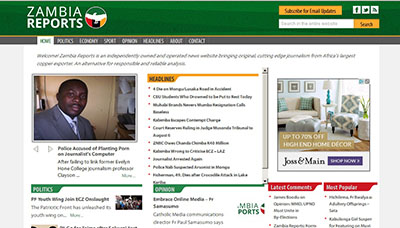Cape Town, July 30, 2013–Zambian authorities should stop blocking access to critical news websites and halt their harassment of journalists accused of working with the websites, the Committee to Protect Journalists said today after reports emerged of widening government obstruction.
“Zambia presents itself as a peaceful democracy, yet these attacks on media outlets with which government disagrees are actions that belong to an authoritarian regime,” said CPJ’s Africa Program Coordinator Sue Valentine. “We urge government to talk with editors, journalism academics, and other members of civil society to find a common understanding of the principles of freedom of expression and the right of citizens to access information.”
Zambia Reports, a news website launched in February 2012, said domestic access to its site was at first interrupted on July 16. A managing editor of Zambia Reports, who spoke on condition of anonymity fearing retaliation, said mobile phone users and customers of one Internet service provider were still able to access the site at that point. Two days later, on July 18, the site was completely blocked domestically, he said.
The managing editor told CPJ that the staff believed the government was responsible for the blocking. Zambia Reports has been critical of the ruling Patriotic Front that was voted into power in September 2011, ending two decades of dominance by the Movement for Multiparty Democracy.
The editor told CPJ that while the site had a “reputation for expressing critical views,” the staff had not broken any laws. He added that the site had not received any complaints from the government about its reporting.
Zambia Reports filed a complaint to the Zambian Information & Communication Technology Authority (ZICTA) about its blocking on July 22, but has received no reply.
The blocking of Zambia Reports follows harassment and obstruction of Zambian Watchdog, a site that documents alleged government corruption. Watchdog, which was blocked in mid-July, has been targeted several times by the government, and its journalists have also come under fire.
Police re-arrested Clayson Hamasaka, a journalist who they have accused of contributing to the Zambian Watchdog. Hamasaka, who was detained earlier this month, was picked up again on Monday on charges of “possession of obscene material” and released on bail, according to news reports.
Another journalist, Wilson Pondamali, who was arrested on July 16 and accused of writing for the Watchdog, contracted pneumonia in prison, according to a report by the Media Defence Legal Initiative (MDLI).
The MDLI reported that Pondamali has been charged with possession of military pamphlets, although the precise nature of the docs was not disclosed. According to an AFP report, Pondamali has been granted bail, but remains under police guard in hospital.
The MDLI together with the Southern African Litigation Centre have petitioned the United Nations and the African Commission to intervene in Pondamali’s case.
Zambian Vice President Guy Scott told the private Post paper last week that the Zambian Watchdog deserve to be blocked because it was “inciting people to hatred” and that its reporting was “malicious, vicious and fictitious.” The Post cited Scott as saying that Watchdog reports accused the government of Satanism, and often reported false news.
In a letter to the Ministry of Information and Broadcasting Services delivered on July 23 and published online on July 25, the website asked the Ministry to provide reasons for the blocking and organize an internal inquiry regarding the blocking of both websites. Zambia Reports has received no acknowledgement of the letter.
- For more data and analysis, visit CPJ’s Zambia page here.
